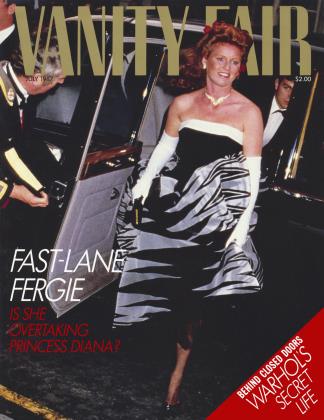Sign In to Your Account
Subscribers have complete access to the archive.
Sign In Not a Subscriber?Join NowREADERS BITE BACK
Letters
Dennis the Menace
Ron Rosenbaum in his interview with Dennis Hopper [April] asked him about a line of mine in Easy Rider: "You know, Billy—we blew it." Dennis replied, "Peter said he never understood why I had him say that line." I would just like to make clear that at no time did I not understand why I said the line. I wrote the line. Dennis wanted me to say some lines about our inheritance, morals, drug money, etc. I simply wanted to say "We blew it," for the very reasons Ron mentions in the interview. When I called Dennis with the story in September 1967, he said, "That's terrific, man, what do you want to do with it?" I said, "You direct, I'll produce, we'll both act. We can save some money that way." I called him because I knew the genius (I don't use that word lightly) he had and still has.
PETER FONDA Rome, Italy
Years ago when my daughter Michelle Phillips told me she was about to wed Dennis Hopper, I almost suffered a meltdown. I didn't attend their Halloween-eve wedding but offered my congratulations in a two-word message: "Happy Halloween." Michelle and I are still great friends, and she recently told me that as an Academy Award balloter she had cast her vote for Dennis. Good girl!
GARDNER GILLIAM Los Angeles, California
Once l_s Enough
I'm all in favor of book reviewers having strong opinions about books, but surely they should not vent their personal spleen against the helpless subject of a book.
Mr. Wolcott has a perfect right to dislike Barbara Seaman's biography of Jacqueline Susann [April], but should a book review serve as a transparent excuse for vilifying Jackie or, worse, tastelessly ridiculing the fact that she had cancer?
I was Jackie's editor (on The Love Machine), and whatever else could be said for or against her (and I was very fond of her), she had remarkable courage. She kept her illness secret, except from her closest friends, never exploited it, and endured considerable pain and inevitable fear without complaint. Wolcott may not like her—that's his privilege— but the way he writes about the disease that killed her is simply obscene. "The asp that slayed this dingdong Cleopatra"? "The last part of her to die was the hand that signed autographs"?
Come on! Those remarks are tasteless far above and beyond the call of Mr. Wolcott's duty, whatever that may be. Certainly, Jackie did nothing to deserve this bilious and trashy treatment from somebody who either doesn't enjoy popular fiction or is obviously envious of those who write it successfully.
MICHAEL KORDA Simon and Schuster New York City
All we want to know is, who peed in Wolcott's Wheaties?
JULIE RIDGE and MURRAY RUBINSTEIN New York City
Bull Session
As an aficionado of the corrida, who has spent the last twenty summers going to bullfights in Spain, I take offense when you say about the matador Espartaco [April] that "just before delivering the death blow, he sinks to his knees in the sand and dances provocatively at the bull." This is absolutely not true, and would upset anyone who considers the bullfight an art form. While Espartaco and others are known to do adornos on their knees during their faenas, they would not dare perform such a vulgar act immediately before the kill. To dance provocatively in front of the animal would disgrace it, and Espartaco, whom I have seen fight over fifty times, would never think of doing this just before the so-called moment of truth.
JOSEPH DISTLER Vice president, Club Taurino of New York New York City
Between Love and Madness
With tongue planted firmly in cheek— the quality that captured and held my interest in Vanity Fair—it should be impossible to suck up to anyone. But I don't know how else to interpret the unadulterated flackery of your May cover story on the Kleins. Do not do this. Vanity Fair is a "hot book" because it is lively and irreverent, bemused but not meanspirited, celebratory but not sycophantic. It's far more attractive to readers than a vanity press dedicated to the life-styles of the rich and famous accounts you have or want.
CHRISTOPHER QUILTER
New York City
Clnb-Culture Gap
I was shocked to see that Brad Gooch's article on discotheque culture [May] listed the Underground (860 Broadway, 254-4005) with the dates 198086, implying that the club has closed. Not only is the Underground open, it has not missed a single weekend in the seven years it has been open. In 1986 the Underground housed over thirty East Village art shows, and we take very seriously the implication that we have closed. This kind of inaccuracy is very injurious to business.
BAIRD JONES
New York City
Studio 54 was the worst thing that ever happened to me. Yet, I thought, it was the best time I ever had. I moved to New York in 1975 to break into show business. Lee Strasberg was my teacher. Interview magazine called me "an All-American millionette." The night Studio 54 opened was a metaphysical experience. During the next five years I did drugs at Studio 54 almost every night. I lost every friend I ever had. My career went down the tubes. In 1982 I came home to Denver to heal. I'm still picking up the pieces. Thank you for the stroll down a disturbing memory lane.
RANDY WREN Denver, Colorado
Letters to the editor should be sent with the writer's name, address, and phone number to: The Editor. Vanity Fair, 350 Madison Avenue. New York. New York 10017. The letters chosen for publication may be edited for length and clarity.
 View Full Issue
View Full Issue












Subscribers have complete access to the archive.
Sign In Not a Subscriber?Join Now